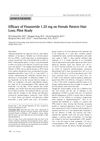 11 citations,
February 2004 in “Clinical and Experimental Ophthalmology”
11 citations,
February 2004 in “Clinical and Experimental Ophthalmology” Taking Propecia might lead to the development of cataracts.
 11 citations,
May 2002 in “The Journal of Urology”
11 citations,
May 2002 in “The Journal of Urology” Finasteride doesn't harm bone density in older men with BPH.
 11 citations,
November 2001 in “Journal of Chromatography B: Biomedical Sciences and Applications”
11 citations,
November 2001 in “Journal of Chromatography B: Biomedical Sciences and Applications” Finasteride and analogues separated using LC-MS-MS technique.
 11 citations,
October 1994 in “The Journal of Clinical Endocrinology and Metabolism”
11 citations,
October 1994 in “The Journal of Clinical Endocrinology and Metabolism” Finasteride increases hair growth, prolongs hair cycle, and lowers dihydrotestosterone levels.
11 citations,
October 2021 in “Journal of The European Academy of Dermatology and Venereology” Topical finasteride is an effective and safer treatment for male hair loss.
10 citations,
February 2021 in “International Journal of Nanomedicine” Chitosan-decorated finasteride nanosystems improve skin retention and could be a better treatment for hair loss.
 10 citations,
October 2020 in “Microscopy and Microanalysis”
10 citations,
October 2020 in “Microscopy and Microanalysis” Resveratrol helps prevent finasteride-induced damage in male rats, improving reproductive function.
 10 citations,
May 2019 in “International Journal of Environmental Research and Public Health”
10 citations,
May 2019 in “International Journal of Environmental Research and Public Health” Finasteride may cause kidney damage.
 10 citations,
February 2019 in “Toxicological Sciences”
10 citations,
February 2019 in “Toxicological Sciences” Finasteride exposure affects gene expression and anogenital distance in male rat fetuses.
 10 citations,
January 2019 in “in Vivo”
10 citations,
January 2019 in “in Vivo” Finasteride boosts stem cell signals for hair growth.
10 citations,
December 2018 in “Medical Science Monitor” The MAPK/ERK pathway is crucial in controlling cell growth and death in finasteride-induced hypospadias.
 10 citations,
January 2017 in “Skin Pharmacology and Physiology”
10 citations,
January 2017 in “Skin Pharmacology and Physiology” Finasteride may cause vitiligo, sexual issues, and depression; better treatments and predicting side effects needed.
 10 citations,
March 2016 in “Journal of The American Academy of Dermatology”
10 citations,
March 2016 in “Journal of The American Academy of Dermatology” Finasteride's effectiveness for frontal fibrosing alopecia is uncertain.
10 citations,
September 2015 in “Folia Histochemica Et Cytobiologica” Finasteride treatment in male rats can reduce fertility and affect sperm development in their offspring.
 10 citations,
February 2015 in “Journal of Pharmaceutical and Biomedical Analysis”
10 citations,
February 2015 in “Journal of Pharmaceutical and Biomedical Analysis” Finasteride's polymorphic form affects capsule quality and drug effect, requiring strict control.
 10 citations,
January 2015 in “The Journal of Clinical Pharmacology”
10 citations,
January 2015 in “The Journal of Clinical Pharmacology” No clear link between finasteride use and acute pancreatitis risk.
 10 citations,
December 2014 in “PubMed”
10 citations,
December 2014 in “PubMed” Finasteride, a hair loss drug, may cause sexual dysfunction and depression, but these effects are usually temporary and the drug is generally safe. More research is needed.
 10 citations,
September 2014 in “The Journal of Steroid Biochemistry and Molecular Biology”
10 citations,
September 2014 in “The Journal of Steroid Biochemistry and Molecular Biology” Allopregnanolone increases KCC2 expression in baby male rats' brains, while finasteride doesn't affect it.
 10 citations,
January 2012 in “Annals of Dermatology”
10 citations,
January 2012 in “Annals of Dermatology” Finasteride 1.25 mg showed small improvements in hair density and thickness for female pattern hair loss, but more research is needed.
 10 citations,
June 2011 in “Archives of Dermatology”
10 citations,
June 2011 in “Archives of Dermatology” Finasteride caused blisters on hands and feet.
 10 citations,
October 2010 in “International Journal of Andrology”
10 citations,
October 2010 in “International Journal of Andrology” Finasteride doesn't affect oral testosterone undecanoate, and high DHT levels may cause acne, prostate issues, and hair loss.
 10 citations,
June 2010 in “Expert Opinion on Drug Metabolism & Toxicology”
10 citations,
June 2010 in “Expert Opinion on Drug Metabolism & Toxicology” Finasteride reduces prostate cancer risk but may increase high-grade cancer chances.
 10 citations,
May 2010 in “Analytica Chimica Acta”
10 citations,
May 2010 in “Analytica Chimica Acta” New tests detect finasteride and dutasteride in urine quickly and easily.
 10 citations,
October 2009 in “Clinical Therapeutics”
10 citations,
October 2009 in “Clinical Therapeutics” Finasteride 5-mg oral disintegrating tablets and standard tablets are bioequivalent in healthy adult male Han Chinese volunteers.
 10 citations,
December 2008 in “Journal of Clinical Neuromuscular Disease”
10 citations,
December 2008 in “Journal of Clinical Neuromuscular Disease” Finasteride can cause muscle pain and high creatine kinase levels, but stopping the medication may resolve symptoms.
 10 citations,
October 2008 in “Andrologia”
10 citations,
October 2008 in “Andrologia” Finasteride changes antioxidant enzyme expression, possibly affecting sperm protection in rats.
 10 citations,
June 2001 in “PubMed”
10 citations,
June 2001 in “PubMed” Finasteride is effective in growing hair and stopping hair loss in men with mild to moderate alopecia.
 10 citations,
April 2000 in “Archives of Oral Biology”
10 citations,
April 2000 in “Archives of Oral Biology” Minocycline may cause hair loss by increasing DHT levels, but finasteride can help counteract this effect.
 10 citations,
January 2000 in “PubMed”
10 citations,
January 2000 in “PubMed” Both finasteride and GnRH agonist treatments reduced hair growth in women with idiopathic hirsutism, but GnRH agonist was more effective.
 10 citations,
March 1999 in “Comparative Haematology International”
10 citations,
March 1999 in “Comparative Haematology International” Androgens increase EPO production, finasteride doesn't significantly impact it.


























